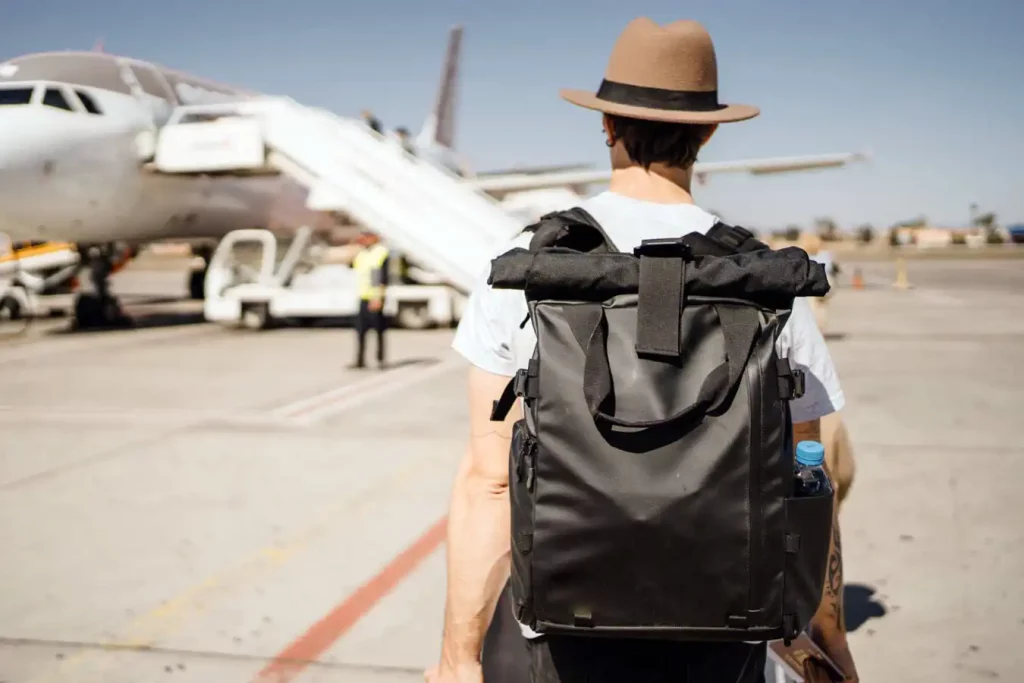“How much should a backpack weigh?” is a question many travelers, hikers, and students often ponder.
Overloading can cause back strain, while packing too light might mean forgetting essential items.
So, what's the sweet spot?
Hang tight, because we're about to spill the beans on the ideal backpack weight.
Ready to give your shoulders a break?
Understanding the Importance of Backpack Weight
Effects of Heavy Backpacks
Strain on the Body
Carrying a backpack that's too heavy can place an undue burden on your body, particularly on your neck, shoulders, and spine. Picture this: you've just packed for a weekend hiking trip, but your backpack feels like you're carrying a small boulder.
As you trek, your body leans forward to compensate for the extra weight, straining your neck and back muscles. In the short term, this can lead to aches, pains, and potential muscle damage.
Long term Health Effects
The damage, however, isn't limited to short-term discomfort. Over time, the effects of lugging around an excessively heavy backpack can lead to chronic issues. Continual strain on the spine could lead to alterations in your natural posture or even more severe conditions like scoliosis.
Imagine your body as a building, with your spine as the main supporting column. Just as with a building, excessive and prolonged pressure can cause that column to bend, leading to long-term damage.
Benefits of a Well-Balanced Backpack
Improved Posture
On the flip side, a well-balanced and appropriately-weighted backpack can promote better posture. Remember that hypothetical hiking trip? With the right weight, your body remains upright, maintaining the natural ‘S' curve of your spine. It's akin to having a built-in reminder to keep your shoulders back and head high.
Better Mobility and Comfort
A properly weighted backpack also enhances mobility and comfort. Think about navigating through a crowded airport with a suitcase. The lighter the suitcase, the easier it is to move around. Similarly, a well-weighted backpack makes for easier commuting, whether you're weaving through a bustling city or climbing a steep mountain trail.
Learn more: How Much Should a Backpacking Tent Weigh
Factors Influencing Backpack Weight
Purpose of the Backpack
School Use
If your backpack serves as a mobile locker for school supplies, the contents – and thus the weight – can add up quickly. Experts recommend that a student's backpack weigh no more than 10% of their body weight. Therefore, for a 120-pound student, the backpack should ideally weigh between 12 pounds. Especially children should not carry heavy objects.

Read more: How Many Books Can You Put Into an Empty Backpack
Hiking or Outdoor Activities
For hiking or other outdoor activities, the weight of the backpack becomes even more critical. You have to consider your essentials, such as food, water, clothing, and emergency supplies. The recommended weight here usually falls within 15-20% of the person's body weight. So, if you're a 180-pound adventurer, your backpack should ideally weigh between 27 to 36 pounds.
Know more: How Much Weight Can a Backpack Hold

Travel
For travel purposes, the weight of your backpack is governed by the airline regulations as well as your comfort. No one wants to lug around a 50-pound backpack while sightseeing. The rule of thumb here is also 10-15% of your body weight, but make sure to check with your airline for any specific weight limits.

Individual's Body Weight and Fitness Level
Ideal Backpack Weight for Children
For children, especially those in their growth phase, it's essential to limit the backpack weight to avoid long-term health issues. As a rule, a child's backpack should not exceed 10% of their body weight. For instance, if your child weighs 80 pounds, their backpack should not weigh more than 8 pounds.
Ideal Backpack Weight for Adults
For adults, the ideal backpack weight depends on the individual's fitness level and body weight. As a general guideline, it should not exceed 15% of their body weight for everyday use. However, physically fit individuals who regularly exercise their core and back muscles can carry more than this guideline if needed for specific activities like hiking or backpacking.
How Much Should a Backpack Weigh?
Backpack weight should ideally not exceed 10-15% of an individual's body weight for everyday use, and up to 20% for strenuous activities like hiking, depending on fitness level. However, these are guidelines, not strict rules, and comfort should always be the primary factor.
Understanding Backpack Weight Limits
Backpack weight limits are not arbitrary numbers. They're carefully calculated guidelines based on the average carrying capacity of an individual relative to their body weight. These limits are set to prevent undue strain on the body, especially the spine, and promote good posture and comfort.
The Human Body and Backpack Weight
The human body is not designed to carry heavy loads for extended periods. Our spine, despite being a robust structure, can only bear so much weight before it starts showing signs of strain. This is why understanding how much weight your body can comfortably carry in a backpack is crucial to preventing potential health issues down the line.
Optimal Backpack Weight for Children
For children, it's recommended that their backpack weigh no more than 10% of their body weight. This limit is set considering their developing bodies and the potential for long-term damage from carrying heavy loads at an early age.
Ideal Backpack Weight for Students
Students often carry backpacks laden with heavy textbooks, laptops, and other school supplies. To prevent unnecessary strain, it's suggested that a student's backpack should weigh between 10-15% of their body weight.
Backpack Weight for Hikers and Outdoor Enthusiasts
For hikers and outdoor enthusiasts, backpack weight becomes a balance between carrying necessary supplies and ensuring ease of movement and comfort. The recommended backpack weight for such activities is generally 20-25% of the person's body weight.
So, a backpack should ideally weigh no more than 10% of the individual's body weight to avoid strain and potential health issues.
Why no more than 10%?
My body weight is 75 kg and I can lift anything from 20 to 40 kg, but carrying it is not the same thing.
Take a backpack means to carry your necessary things for a long time; in this case, you have to take according to your body's carrying capacity.
Read more: What Size is a Standard Backpack
General Guidelines on Backpack Weight
The '10 Percent Rule' Explained
The '10 percent rule' is a widely accepted guideline suggesting that the weight of your backpack should not exceed 10% of your body weight. This rule is based on the principle of ensuring comfort, preventing physical strain, and promoting good posture.
When and Why You Might Need to Exceed the 10 Percent Rule
The '10 percent rule' might not always apply, especially in situations like hiking or traveling where you need to carry more supplies. In such instances, backpack weight can go up to 15-25% of your body weight, provided it's carried comfortably and distributed evenly.
Tips to Reduce and Distribute Backpack Weight Effectively
Packing Techniques
Proper packing can significantly reduce the perceived weight of your backpack. Start by packing heavier items at the bottom and close to your back. This method helps maintain your center of gravity and reduces strain.
Essential Items Only Rule
Only pack items necessary for your journey. Each additional item adds to the weight of the backpack. Adhering to the ‘essential items only' rule can help lighten the load.
Proper Adjustment and Wearing of Backpack
Ensure your backpack is well-adjusted with the weight distributed evenly. The straps should be tightened so the pack is close to your body, reducing the leverage effect of the weight.
Learn: How to Carry Skateboard on Backpack
Factors to Consider when Choosing a Backpack
Size and Capacity
When choosing a backpack, consider its size and capacity. A bigger backpack might tempt you to pack more items, thereby increasing the weight. Choose a size that suits your needs without encouraging overpacking.
Material and Durability
The backpack material contributes to its weight and durability. Lightweight materials that can withstand the rigors of your journey are preferred.
Comfort and Adjustability
Your backpack should have adjustable straps and a design that promotes comfort, especially when carried for extended periods.
Reviews of Some Recommended Backpacks
Given the myriad of options available, looking at product reviews can be very helpful. Reviews from real users provide insights into the practicality, durability, and comfort of different backpacks, helping you make an informed decision.
Read more: Best Backpack for Moms with Toddlers
Expert Advice on Backpack Weigh
Carrying the right weight in your backpack is crucial for your well-being and comfort during your journeys. Let's explore insights from healthcare professionals and experienced hikers and travelers to guide you in finding the optimal balance.
Insights from Healthcare Professionals
Healthcare professionals emphasize the importance of backpack weight in maintaining good posture and preventing long-term health issues. They recommend adhering to the recommended weight guidelines based on body weight and fitness level. Consulting with a healthcare professional can provide personalized advice based on individual circumstances.
Tips from Experienced Hikers and Travelers
Experienced hikers and travelers have valuable firsthand knowledge on backpack weight management. They emphasize the significance of packing light, prioritizing essential items, and utilizing efficient packing techniques. Distributing weight evenly and making proper adjustments to the backpack can greatly enhance comfort and reduce strain during long journeys.
FAQs About How Much Should a Backpack Weigh
How much should an average backpack weigh?
The weight of an average backpack should ideally be no more than 10-20% of the user's body weight. This is to ensure comfort and to prevent strain or injury to the back and shoulders.
Is 35 pounds heavy for a backpack?
Yes, 35 pounds is considered heavy for a backpack. Such weight could cause significant strain on your back and shoulders, especially if carried for prolonged periods or during strenuous activities.
How much should a backpack weigh for school?
A school backpack should ideally weigh no more than 10-15% of a child's body weight. This means if a child weighs 50 pounds, their backpack should not exceed 5-7.5 pounds.
How much should an empty backpack weigh?
The weight of an empty backpack can vary widely based on its size, materials, and design. However, a typical empty daypack often weighs between 1 to 3 pounds.
Is 40 lbs too heavy for a backpack?
Yes, 40 lbs is typically considered too heavy for a backpack. Consistently carrying such weight can lead to muscle strain or injuries, especially if the load is not distributed evenly or the backpack isn't worn properly.
Is 25 pounds heavy for a backpack?
Yes, 25 pounds can be considered heavy for a backpack, especially for individuals with lower body weight. Properly adjusting the straps and making use of hip and chest belts can help distribute the weight evenly and reduce discomfort.
Final Words on How Much Should a Backpack Weigh
In conclusion, the weight of your backpack plays a significant role in your overall comfort, posture, and physical well-being.
Understanding the recommended weight limits based on body weight and activity type is crucial. By following expert advice, such as insights from healthcare professionals and tips from experienced hikers and travelers, you can optimize your backpack weight and enjoy your adventures with ease and comfort.
Remember, prioritize your well-being, pack smartly, and embark on your journeys with a backpack that supports you every step of the way.
Read next: How to Make Backpack Straps Longer


